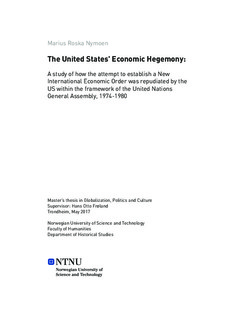| dc.contributor.advisor | Frøland, Hans Otto | |
| dc.contributor.author | Nymoen, Marius Roska | |
| dc.date.accessioned | 2017-09-19T08:06:35Z | |
| dc.date.available | 2017-09-19T08:06:35Z | |
| dc.date.issued | 2017 | |
| dc.identifier.uri | http://hdl.handle.net/11250/2455306 | |
| dc.description.abstract | In 1974, the United Nations General Assembly (UNGA) convened for its first ever special session devoted to economic and social issues in the third world. It resulted in the proclamation of a New International Economic Order, an order which was to be responsive to the needs of the third world and accommodate their development. NIEO was, although supported by a majority of the countries of the world, never implemented. This thesis analyses how the United States repudiated the establishment of a new economic order within the framework of three special sessions of the UNGA: the sixth in 1974; the seventh in 1975; and the eleventh in 1980. It analyses the behaviour of the US by focusing on the position and rhetorical argumentation used in verbal communication. The thesis argues that their tactical behaviour differed in each session, albeit having the same intention: restraint of NIEO to safeguard the (old) economic order. The US’ rhetoric remained consistent and attempted to convince third world countries that measures affiliated with NIEO, e.g. raw materials cartelisation and international price-fixing would not contribute to enhance their development. The hegemonic position of the US, both in terms of military and economic capacity make up the reason for why NIEO was never successfully implemented. It is concluded that the behaviour of the US in the sixth special session, in which they refused to accept the NIEO, effectively left the new order dead on the day of its adoption. | nb_NO |
| dc.language.iso | eng | nb_NO |
| dc.publisher | NTNU | nb_NO |
| dc.title | The United States' Economic Hegemony - A study of how the attempt to establish a New International Economic Order was repudiated by the US within the framework of the United Nations General Assembly, 1974-1980 | nb_NO |
| dc.type | Master thesis | nb_NO |
| dc.subject.nsi | VDP::Humaniora: 000::Historie: 070::Økonomisk historie: 074 | nb_NO |
| dc.subject.nsi | VDP::Humaniora: 000::Historie: 070::Samtidshistorie (etter 1945): 084 | nb_NO |
| dc.subject.nsi | VDP::Samfunnsvitenskap: 200::Statsvitenskap og organisasjonsteori: 240::Internasjonal politikk: 243 | nb_NO |
